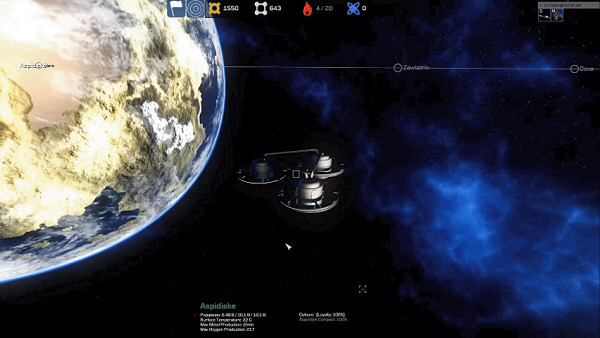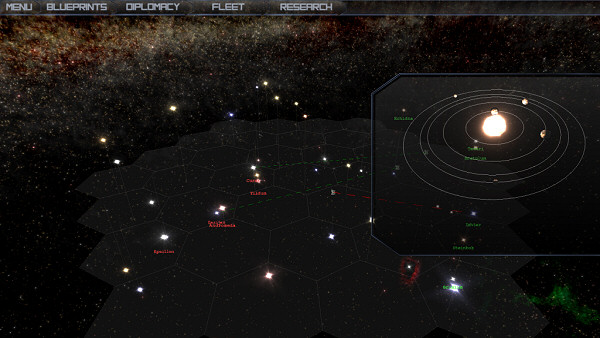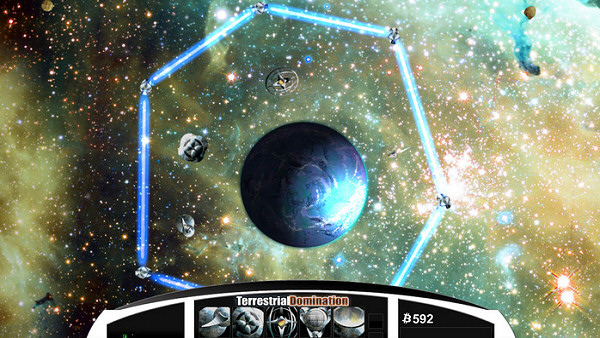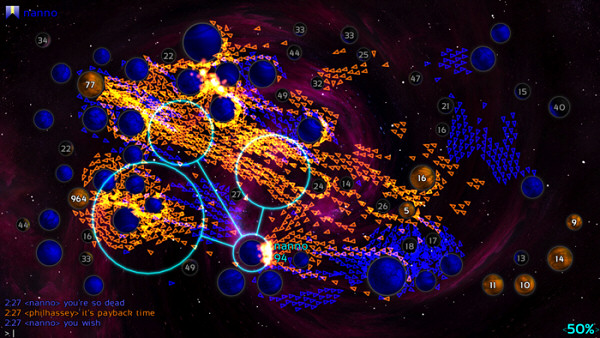Time for another Kickstarters update. In the last update we covered the successful Kickstarters Strike Suit Zero, a space combat shooter (already out), the space trading and combat simulation Star Citizen, the sci-fi RTS Planetary Annihilation, or the space 4X game M.O.R.E., among others. And, some others that were not so fortunate as well.
Now, here’s a new round of successful, and unsuccessful crowdfunding space-based and sci-fi themed gaming adventurers.
Elite Dangerous: space trading and combat simulation -> Made it!
David Braben, the designer of Elite, succeeded on Kickstarter with Elite Dangerous, a sequel to the 1984 classic space combat game, now with “stunning visuals” and the ability to “play with your friends” with peer-to-peer technology in a “lobby-less way”. Braben admitted that Kickstarter would be used as an experiment, as a way to check if there would be enough interest to justify making such a game. Well, apparently there was :) He asked for £1.25M/$2 million, and got £1,578,316/~$2.5M (126% of the funding goal). After a period of post-kickstarter inactivity, the devs stated the intention to go into full production mode soon, and should be resuming their dev diaries and other feedback to backers also soon. The ETA for Elite: Dangerous is March 2014 for the PC. Mac users will have to wait a bit more.
Colonia: real-time space 4X strategy game -> Didn’t make it.
Richard Orr proposed a slightly different kind of space 4X game experience. The idea would be not to achieve supremacy over an entire galaxy but to confine the experience in a single star system, with a focus on more realistic distances between space objects. Combat would play a major role, as for terraforming, since there wouldn’t be that many worlds to expand to. Unfortunately, Richard was not successful on Kickstarter, achieving only $2,060 of his $12,000 goal (~17%) . The dev didn’t leave any hint if development would continue or not, as he didn’t post a closing update. At least not yet. And, no game webpage was referenced either, where more info about the game could be found. I enjoyed watching your Kickstarter videos Richard, and I really think you had something here. Better luck next time.
Limit Theory: space combat simulation / RPG / RTS -> Made it!
Josh Parnell proposed a fully procedural sandbox space combat game. Procedural meaning, different space bodies and ships – and its textures – uniquely generated by the computer every time you play, so that every game is different. The idea would be to mix RPG and RTS mechanics by taking control of one ship on a first or third-person perspectives. Besides combat, the game would also offer planet exploration aspects, as for planet buildings construction. Josh was successful on Kickstarter, and by a large margin, achieving $187,865, which was 375% of his initial goal. We’ll be able to enjoy Josh’s procedural single-player PC game by around January 2014.
Predestination: turn-based space 4X strategy game -> Made it!
Brendan Drain and his team went to Kickstarter in order to turn Predestination into a reality. And they were quite successful. Predestination is an interesting turn-based space 4X game (it’s part of “Sci-Fi/Space Games You Can’t Miss in 2013” list) that we were already following before the Kickstarter campaign. What distinguishes it from other space 4X games out there, is the planetary exploration depth that they want to achieve, where it will be possible to explore different sections of each planet. Another particular distinctive aspect is that you can establish multiple colonies in the same planet. They also promise a new approach to deal with excessive micromanagement through the use of colony building blueprints. Multiplayer is envisaged through PBEM, hotseat and LAN. The estimated delivery date is December 2013 for Windows PC. To know more about the project check out our interview with Brendan.
Hegemonic: tabletop space 4X board game -> Made it!
And now a non-computer game for a change. Hegemonic is a space 4X board game by Minion Games, a producer already familiarized with the ways of Kickstarter for launching their tabletop gaming products. KS is a vehicle they use to know how many games they may go ahead and print. Hegemonic was their seventh Kickstarter campaign and their sixth success (they had to re-launch their first KS attempt, but they were also successful at a second attempt). Like in any space 4X game, in Hegemonic you assume the role of a leader or ruler, explore space, expand your dominion, develop your industry, grow your military and ultimately seek to vanquish everyone else through more or less diplomatic means. Minion Games achieved $77,396 of their initial goal of $30,000, for more than 250% funding, and expects to deliver Hegemonic on July 2013.
Terrestrial Domination: real-time space strategy -> Didn’t make it.
The idea with Terrestrial Domination was to choose a faction and try to conquer your enemy’s planet before they conquer yours. The concept is very simple, but what made it compelling in the first place was the amount of interesting things you could do to achieve your goal. You could colonize other planets for resources, or build space stations and ships, but above all you could employ different tactics and special attacks, like cool force field barriers or rotating super lasers. The mechanics looked simple but quite refreshing. However, this didn’t seem enough to convince people to support Chris Johnson’s proposal. The indie dev is now rethinking his strategy and considering alternatives, like perhaps going alpha funding on Desura, submit a Steam Greenlight or simply re-launch KS with different goals. Good luck on your endeavor Chris.
Skyjacker – Starship Construction: space combat / ship design app -> Made it!
And three was a charm. Digitilus went to Kickstarter for the third time to help fund their space combat game, Skyjacker. But, instead of putting the main game on the line, this time they went with a smaller goal: an app to design spaceships, supposedly an in-game tool, which will be included in the main Skyjacker game. This KS campaign was a bit confusing, at least for folks with limited knowledge or simply new to the Skyjacker concept. It was confusing because although the Kickstarter’s aim was the ship design app itself, it was clear that what the Digitilus Team were really after was for support for their Skyjacker main game, which was in fact part of one of Kickstarter’s rewards. But, they made it. Barely, but they did, with $6,000 extra on top of the $30,000 which they asked for the Starship constructor app. This app should be ready around May of 2013, while the Skyjacker full game is expected to come around August 2013, for the PC, Mac and Linux.
Galcon 2 – Galactic Conquest: real-time space strategy game -> Made it!
He barely made it, Phil Hassey, the creator of Galcon – a simple RTS game where you need to colonize planets and build as many ships as fast as you can. Phil made it on Kickstarter by $2,642 for a total of $25,741 raised. Phil has come a long way with his Galcon concept, and after Android and iPhone and then iPad and Windows (Galcon Fusion) he now went after a sequel to enhance some of Galcon’s core features and bring it Windows, Mac and Linux. Apparently, Galcon2 will be free to play and will have the same core gameplay aspects as Galcon Fusion, but with two major additions: a galaxy map to track records and different classes (or powers). Nothing was developed pre-Kickstarter. Phil’s idea was to develop Galcon2 in a community-centered way, where prototypes will be sent to backers for feedback. Congratulations Phil, it seems like you’ll be able to start your prototyping and bring us your new frenetic-paced space game installment in the near future. The final product delivery date was not specified though.
Conclusion
In this list, six Kickstarters made it out of eight. A very successful ratio I would say. The outperformer was by far Elite: Dangerous, a kickstarter that surely capitalized on the heavy nostalgia effect and on credibility, since the project owner is the same person who was behind the Elite classic space game. A bit like what happened with Star Citizen with Chris Roberts being the developer of the also classic Wing Commander series. In our last update we got six successes out of nine, so the tendency remains consistent.
Of course, this list may not be exhaustive, as there may have been a few other space and sci-fi crowdfunding projects in this assessment period that slipped our radar. The list represents the ones that captured our attention the most. As always, feel free to point them all out in the comments below – only finished and not already covered ones please.
And now our little disclaimer. Till our next Kickstarters update, continue helping our indie sci-fi and space gaming adventurers. But, don’t forget to back thoughtfully! :) Crowd funding is still on its infancy, and there’s always risk involved. Don’t forget to always have that in mind when backing.

13 Comments
Related Articles:
- Galcon 2: Galactic Conquest – Fast-Paced RTS [Kickstarter]
- Skyjacker: Starship Constructor – Three’s a Charm?
- Kickstarters Update: Who Made It and… Who Didn’t – Part IV
- Kickstarters Update: Who Made It and… Who Didn’t – Part I
- The Space Game Invasion Continues – 4 More Space Games at Kickstarter!















There is also M.O.R.E
http://www.kickstarter.com/projects/1447560584/more-oldschool-turn-based-4x-space-strategy-game
Yes, it was covered in part II.
I’m glad to see that the Skyjacker Starship Construction was successful. I ended up pledging for the game on their website after their unsuccessful Skyjacker main project, so didn’t pledge again.
Since I normally prefer turn-based games, I pledged Predestination and am really looking forward to that one (as well as M.O.R.E.).
I like board games too, and really wanted to pledge Hegemonic, but didn’t have the funds :( I’ll probably pick it up after release. It looks good.
Some devs are going to be disappointed – with kickstarter there are probably more 4x games in development than there are people interested in buying them :-) Yes, they have kickstarter money, but thats usually just a fraction of expenses.
Of course thats good for customers, but I think after some games now in production become a major disaster there won’t be so much devs eager to make 4x in the future.
Besides, what’s a bit funny to me – I haven’t so far seen any game that looks half as promising as Star Drive which had a goal of only 7.5k. I don’t buy those guys that say “Hey, look I’ve made a great ghame 20 years ago, give me 2m I’ll make it once again” or “We’ve never made a game, but as soon as we get 0.75m we will make best 4x ever”.
It doesn’t require a 4X game to be Kickstarted to become a disaster. Just look at SotS 2 and Legends of Pegasus.
Regarding Colonia, what stopped me from contributing was this caomment made by the developer: “which is more than I’m prepared to pay out of pocket.” If I had an idea that I believed in I would invest my own money.
“…the devs stated the intention to go into full production mode soon, and should be resuming their dev diaries and other feedback to backers also soon”.
Basically they got the money and will start working on the game ‘soon’. Still can’t believe Elite got that much money based on nostalgia and ‘trust me’.
Nostalgia can be a powerful force :shrug: I figure that’s why games like Planetary Annihilation, Project Eternity, and Wasteland 2 did so well.
I’m going to put on my ’emperor’s new clothes’ hat here, and say that I still think Kickstarter is greatly overrated and over-hyped. A recently conducted analysis found that of the top 50 most-funded Kickstarter projects, 84 percent missed their target delivery dates. As it turns out, only eight of them hit their deadline. Sixteen hadn’t even shipped yet, while the remaining 26 projects left the warehouse months late. And of course the most recent example is Star Drive missing their planned Jan. 31st public beta release.
With Kickstarer, it’s often impossible to say which projects deserve your hard-earned cash. Democracy is lovely, but the traditional funding model has its benefits, too, including a much harder screening and sales pitch process carried out by people with real business experience.
Kickstarter for game development may represent a break from the traditional publisher-developer relationship, but it’s also ultimately the most risky form of pre-ordering a game imaginable. You’re basically paying for a game that doesn’t exist.
Food for thought.
PS….I also wanted to mention that both Kickstarter and Amazon take a pretty hefty cut in the process, especially when you consider that they are basically just middlemen.
Also, when one person was asked if he thought Kickstarter was overrated, his reply that he’d let everyone know once he’s playing the game he backed. ;)
Yeah…he’ll be waiting for a while.
Traditional game development is notorious for delays despite having a publisher holding the whip of contractual obligation. Can’t imagine how timely a bunch of first-time indie devs can manage with a flexible deadline.
A lot of Kickstarter devs are great programmers who genuinely love games but business management is a completely different skill set.
Games missing target delivery dates isn’t something unusual.
I agree that crowdfunding is risky business. And, it’s still unclear how viable the model really is in the long run, at least for games. However, things are moving, and the first wave of games is being delivered (FTL, and Stardrive is close now). We’ll see.
There are many types of pre-orders, but I tend to distinguish crowdfunding pre-orders from other types of pre-orders (e.g. middle development, end of development, …).
For me, crowdfunding is for projects that would never be, or with a very low chance of being, if the project owners would follow the traditional funding means. Projects that are special because they are novel, very interesting, appeal a specific niche or due to some other interesting reason they deserve a spot light and a chance to be made. But, they need support, otherwise they will never get out of paper.
Traditional pre-orders though, the ones you do when a game is well ahead in development, or in some cases even finished (or close) it’s less clear to me why they even exist in the first place (except in boxed games). Not that I’m against people asking for support to finish their games in style, but I simply don’t understand the logic of pre-ordering games that are to be released in a couple of months. Usually they come with a discount, but a discount of what? It’s really a shot in the dark in those cases. Why is this different from Kickstarter? Because these games will be released in any case, while crowdfunding games need a chance to be made.
I, like many others I imagine, am cautious, but also thrilled with this new sea of opportunities. There’s a very fine line to walk here though. There will be good and bad surprises along the way, but I personally think that the benefits outweigh the risks, or in other words, the perils are worth it if in the end we get a few master pieces.
Trust is the keyword here. As someone has said, “It takes years to build up trust, and only seconds to destroy it”. I hope all the crowdfunding appliers have this in mind when they apply but also the people backing projects. In my view they share the same level of responsibility. So, I don’t think crowdfunding should be looked at lightly. It’s real business done by real people (or we hope), so, I advise people to back thoughtfully and always having present that the risk of not getting what’s promised when it’s promised is very high.
“With Kickstarer, it’s often impossible to say which projects deserve your hard-earned cash.”
I have a problem with deserve. None of them deserve anything. It’s a business arrangement, with risks and rewards. I’d say rather which projects that you will take a risk on. So changing that word, It’s not impossible to say which projects *you should risk* your hard-earned funds on, anymore than it’s impossible to say which stock you should buy *you should risk* your hard-earned funds on.
Do your research, don’t take the word of others who have backed, or others who say this is the best thing. Don’t be taken in by glitz and glamour. And don’t be afraid to back out if it gets too big.
If someone says they’re going to deliver in two months, and plan on $10,000 to get things done, but make $100,000- it’s time to ask, how are you planning to mitigate problems in having a project that’s 10x the planned size. And if they can’t answer, then you have to decide whether you’re still willing to take the risk.
I think most people stop thinking once they’ve decided to pledge- if not before. You’re in a gray area as a pledger between an investor and a buyer. You aren’t pre-ordering something. You’re contributing to something being made, with all of the risks that this entails. And if they succeed, you’re getting something for what you contributed. That’s it, and that’s all. So take a bit more look at the who and the how than the what, and you can make good investments.
And don’t invest money that you can’t afford to lose. I’ve seen retailers ‘pre-order’ things with the expectation of that money turning around by the delivery date. Don’t do that. Please.
But overrated and overhyped? Not in the least. It’s the people around that are seeing it for something that it’s not. Especially in relation to actual product.